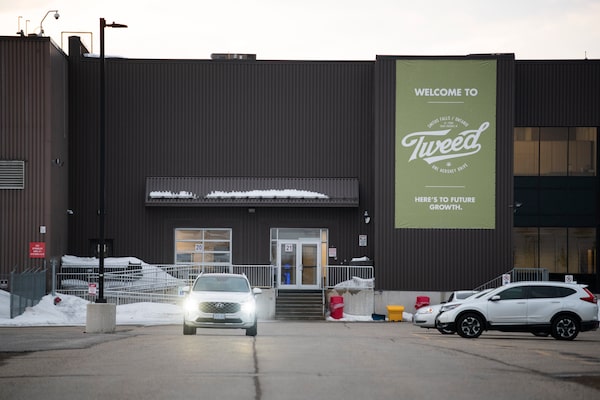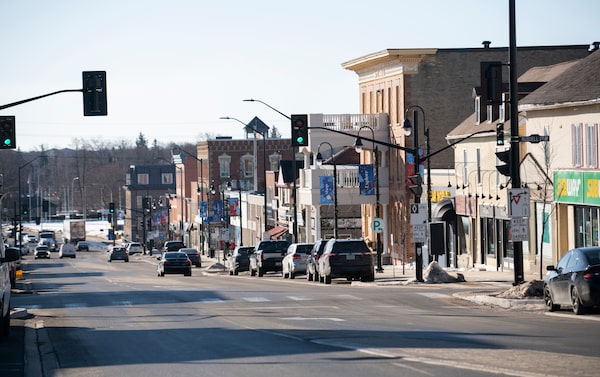
Canopy Growth’s Tweed facility in Smiths Falls, Ont., on Feb 13. The cannabis company has laid off workers and will eventually go down to a workforce of around 350 employees.Fred Lum/The Globe and Mail
Jenn Jefferys is a freelance journalist who was born and raised in Smiths Falls, Ont. She co-hosts the City and Nuuchimii podcast.
I used to love the way Smiths Falls smelled.
The air near 1 Hershey Dr. was so rich you could taste it.
Inside, there were industrial vats of churning chocolate rhythmic enough to hypnotize you and deep enough to drown in. There was a gallery upstairs for visitors to peer down from behind thick panes of plexiglass at the little people in white coats and hairnets working away below, indifferent to the audience of tourists floating by above them.
In the late 2000s, all those hairnetted staff were let go.
Like a bad dream, everything vanished, apart from the Hershey Kiss lampposts in the big empty parking lot and the devastatingly colourful Chocolate Shoppe entrance that hung on there lifeless, frozen in time.
Too expensive and tedious to repaint, our 100-year-old water tower continued to read “Smiths Falls: Chocolate Capital of Ontario,” along with a happy little cartoon Hershey bar, for years after the company abandoned us.
Cheaper labour was on offer in Mexico, apparently, and the global financial crisis made for an easy out for Hershey’s executive class. Something about “supply chain realignment” (?) if I recall correctly.
Soon, Smiths Falls’s entire municipal economy crashed. The Rideau Canal Museum closed, a long-term health care facility shut down, and what other few blue-collar jobs remained dried up also. We had one small movie theatre that seated 700 people in town and even that was demolished.
There were kids whose parents both worked for Hershey and were now both at home collecting unemployment. You can probably guess why hard drugs and heavy drinking were commonplace.
Enter Tweed in 2013, with a sweetheart deal for this long-suffering community – promising hundreds of good jobs, tourism, and a lucrative product that’d soon be legal. They brought celebs such as Snoop Dogg to town and hosted charity golf tournaments, a car show and summer yoga festival, and inspired local stores to start selling weed paraphernalia.
Driving into Smiths Falls today, you’ll notice the sign invites you to “Rise at the Falls” – just one piece of a total municipal rebrand the town underwent after Tweed’s arrival. It really cannot be overstated how far Smiths Falls bent to suit this private business.
The staff at the facility – who harvested in their greenhouses, packaged, labelled and meticulously marketed their products just as Hershey’s staff once did – have built this publicly traded multinational brand from nothing. The people of Smiths Falls were proud to pioneer medical and recreational cannabis. They showed up, nurtured and bred billions of plants that have shipped off around the world, and managed to keep profits moving as best they could during the pandemic.

The view looking south on Beckwith St. in Smiths Falls, Ont. is photographed on Feb 14, 2023. Fred Lum/The Globe and Mail.Fred Lum/The Globe and Mail
Now, after everything, this same town is bracing to lose its single largest regional employer again.
At the beginning of February and along with its third-quarter fiscal reporting, Canopy Growth Corp. announced what it’s cutely calling its “Canadian Business Transformation Plan.” In other words, a “significant reduction in footprint and headcount” that would spell the end of its flagship cultivation facility at 1 Hershey Dr., and at least 800 staff being put out of work.
What I see through this cloud of smoke and betrayal is a clear message that the working class is expendable. We’ve seen similar boom and bust towns across North America that have lived and died at the hands of one large private employer but rarely does the story repeat itself in the same place.
Economists claim there’s a labour crisis stemming from too many workers quitting or refusing to work – the Great Resignation – but this does not apply to the people of Smiths Falls.
My parents, both in their 60s, still work full-time. This is by choice, but also out of necessity.
Matt Lamers, who covers the international cannabis market for Marijuana Business Daily, points out that Canopy benefited from more than $90-million in subsidies during the pandemic, making it the single largest government-subsidized cannabis producer in the world.
I expect that what my family went through when Smiths Falls’s economy crashed will haunt me for the rest of my life. Neither of my parents worked directly for Hershey, but the local downturn befell us just the same, and it wasn’t long before both my parents were out of work. You absolutely cannot understand that misery until you’ve lived through it.
I worry for the kids growing up in small, working-class towns like Smiths Falls today. I worry they too lay awake late at night, staring up at the ceiling, hearing their parents a room away arguing about money. I worry they too are jolted awake some mornings at dawn, by a broken father sobbing atop a creaky staircase, before rushing off to a failing tool business closing in on bankruptcy.
The people of Smiths Falls have carried this billion-dollar company on their backs. By pulling out of 1 Hershey Dr. during a looming recession, record-high inflation, and a once-in-a-generation health care, housing and affordability crisis, Canopy Growth is sure to send Smiths Falls spiralling back toward the social and economic purgatory and despondency from whence it came.
I don’t smell chocolate or weed in my hometown anymore. I just smell misery.